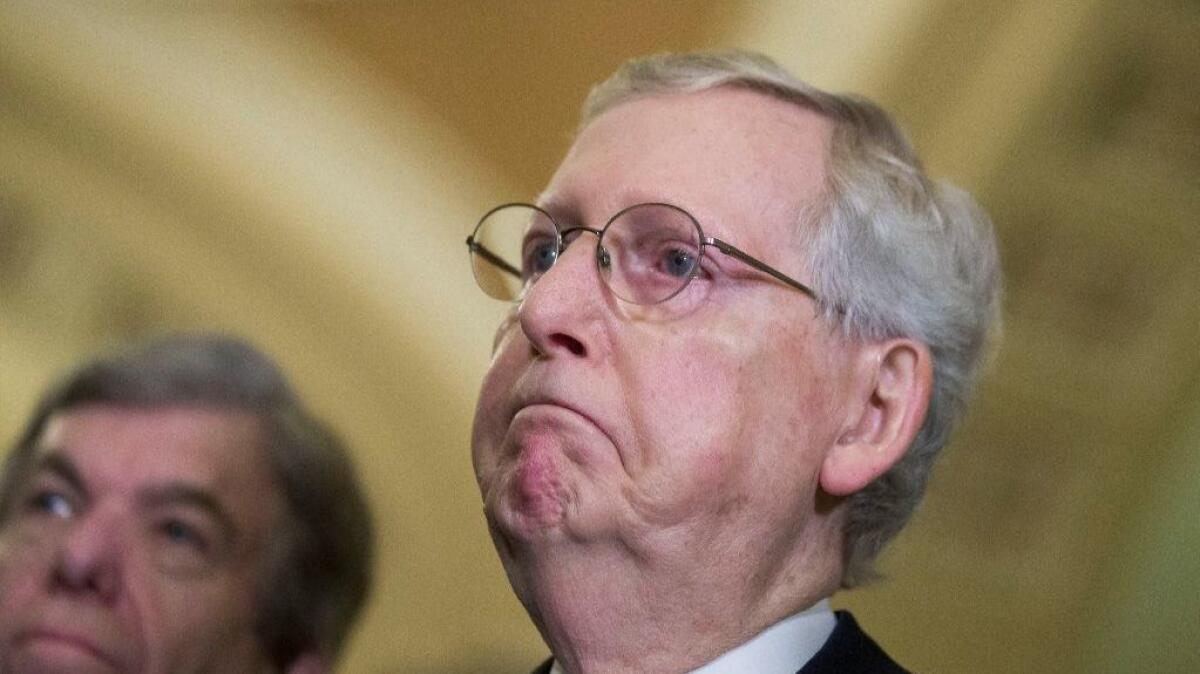Mitch McConnell has decided to stick his head firmly in the sand on the Mueller report

- Share via
Senate Majority Leader Mitch McConnell (R-Ky.) argued Tuesday that Democrats were locked in grief and denial now that special counsel Robert S. Mueller III has found no evidence that the Trump campaign coordinated or cooperated with Russian agents before the 2016 election.
But while McConnell paid noteworthy attention to Mueller’s findings about Russian meddling, he seemed to be in denial himself about the second half of Mueller’s report. In fact, he made nary a mention of Mueller’s findings regarding 10 instances where President Trump potentially obstructed justice.
And that’s the real sticking point, not just for Democrats but for anyone who’s read the Mueller report.
To be clear, Mueller did not accuse Trump of obstructing justice. He explicitly did not exonerate the president either. Instead, he left the issue for Atty. Gen. William Barr and Congress to pursue.
Republicans like McConnell and Barr wave off the concerns about Trump’s efforts to impede the Russia investigation because, as Mueller concluded, there was no proof of collusion. Mueller, however, offered a different reason for not saying whether Trump obstructed justice: The facts, combined with the Justice Department policy against indicting a sitting president, prevented Mueller from reaching a conclusion either way.
Enter the Fray: First takes on the news of the minute »
Barr had objected to the obstruction investigation before he was named attorney general, so it wasn’t a big surprise when he said he found no obstruction by Trump. He contended that Trump was understandably angry about the probe, which somehow meant that Trump had no corrupt motive when he sought to cut short the investigation and have Mueller fired.
House Democrats, on the other hand, are eager to pursue the obstruction question. That’s why the House Judiciary Committee sought to have former White House counsel Donald McGahn submit records and testify about events that Mueller detailed but Trump denied. According to the special counsel’s report, the president told McGahn to pressure the Justice Department to get rid of Mueller. McGahn refused and then the president urged McGahn to lie about the episode.
More than 600 former federal prosecutors have signed a letter asserting that any ordinary citizen who engaged in the behavior described in Mueller’s report would have faced multiple charges of obstruction of justice. Perhaps that’s why McConnell preemptively declared, “Case closed.”
The Judiciary Committee may not hear from McGahn anytime soon — the White House is asserting executive privilege over the documents the committee demanded from him. It’s not clear whether McGahn, who no longer works for the president, will testify on May 21 as the committee had planned.
The battle over documents isn’t likely to diminish Democrats’ interest in pursuing the obstruction issue, however. Meanwhile, House Democrats are pursuing several other lines of inquiry about Trump that have nothing to do with the Mueller report. For example, there are inquiries into his tax returns and his business dealings with Deutsche Bank.
If McConnell really wants to move on from the Mueller report and Trump’s behavior, he could have the Senate tackle some major issues and queue up some consequential policy debates. Healthcare. Immigration. Infrastructure. Online privacy and monopoly. Expanding the middle class. There’s plenty of work to be done on issues that the American people struggle with every day, and the Senate majority leader exerts tremendous control over the chamber’s legislative agenda.
Instead, McConnell has kept the Senate mired in confirmation votes on Trump’s judicial nominees. Maybe he’s the one who needs to turn the page.
More to Read
A cure for the common opinion
Get thought-provoking perspectives with our weekly newsletter.
You may occasionally receive promotional content from the Los Angeles Times.










